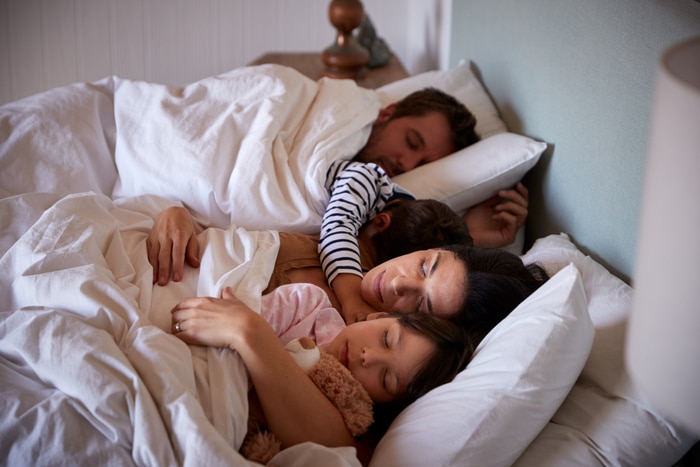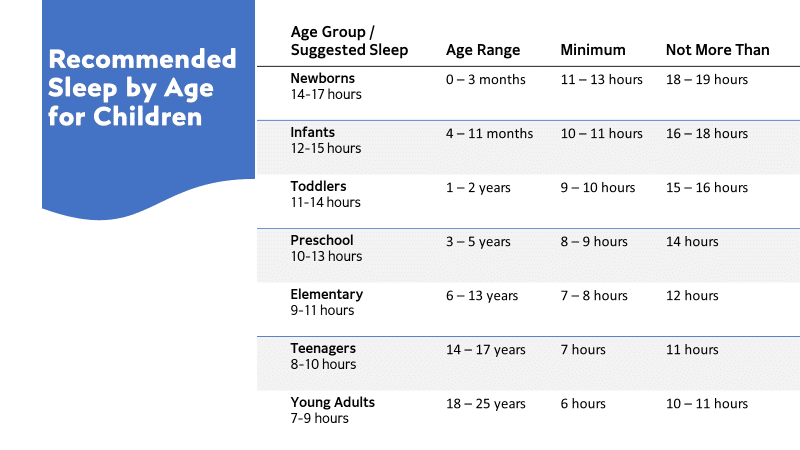Perhaps your kids are getting more sleep than ever these days, with their social activities strictly limited and more time at home. Boredom can increase sleep time, too. Or maybe your kids are pulling all-nighters watching Netflix, making TikTok videos, chatting with friends or, now that school has begun, doing homework and actually reading.
Whatever life’s activities are, everything can be done better and with more enthusiasm and joy when we are well-rested. The same rings true for your kids.
Depending on your child’s age, there are very specific recommendations about how much sleep they should get. Question is: are they? After all, it’s your job as a parent to ensure their wellbeing, and since sleep is fundamental to growth and a strong immune system, to learning and their physical development as well as their emotional wellness, it should be a top priority.
While you, as an adult, likely have adapted to getting less sleep and still being able to get through your day, babies, children and teens don’t cope as well and need significantly more sleep than adults. A child’s early years are so important in terms of development.
So How Much Sleep is “Enough”?
Different amounts of sleep are needed through different stages of development, from babies to a child to a teen—sleep is part of a healthy, holistic lifestyle. So, what’s the rule of thumb? Here’s a chart giving age appropriate and science-based recommendations for total hours of sleep each day including night and daytime naps combined.
As with everything health-wise, knowing the rule of thumb is a great start, but of course, you know your child best. If your baby, child or teen seems to function better on even more sleep, use the above guidelines for sleep as a baseline and add more as you deem appropriate up until the maximum because there is such a thing as too much sleep. In these cases, you may want to evaluate the underlying reason for excessive sleep.
Health Repercussions of Poor Quality Sleep
As we’ve established, sleep is a healthy addition to a holistic lifestyle and critical for your child’s growth and development throughout childhood. This is because, just as sleep can have a positive effect on your child’s health, not getting enough sleep can lead to long lasting health effects if it persists.
Benefits of Sleep
What doesn’t sleep affect? Below is just a short list of the many benefits that sleep can have on your holistic health:
- Improved attention
- Appropriate and improved behavior
- More effective learning
- Stronger memory
- Improved overall mental and physical health
Effects of Sleep Deprivation
The effects of sleep deprivation go far beyond sleepiness during the day. Here are just some of the negative effects that result from sleep deprivation in babies, children and teens:
- A “bad mood”— Irritable, angry, easily frustrated
- Short attention spans
- Lack of memory and overall forgetfulness
- Difficulty with learning
- Low motivation and energy, fatigued or listless
- Anxious, depressed
- Developmentally delayed
Sometimes, half the battle is just getting your child, teen or babies to fall asleep and stay asleep.
How to Foster Good Sleep
Getting quality sleep can often be solved by employing some simple tactics and creating habits, including:
- Create a calm, cool bedroom
- Have a quality mattress
- Make sleep a priority among all family members
- Keep a regular daily routine and bedtime
- Try an early bedtime (for children and babies, 7:00 p.m. and 8:00 p.m. is effective)
- Stay active throughout the day with a mixture of physical and mental activities
- Daily exposure to sunlight outdoors whenever possible
- Resist the temptation to overschedule the day with strict tasks and activities
- Good air flow and dust-free for better breathing
- Limit screen time throughout the day, but especially 2 hours before bedtime
- Be inquisitive—notice your child’s behavior and sleeping habits
In some cases, all that is needed to sleep better is creating the right environment for rest—starting with a cool, dark room and a natural, non-toxic bed. At SAMINA, we believe a Healthy Sleep Solution is a holistic solution.
To learn more about SAMINA healthy sleep products, contact us today and start sleeping better tonight.


